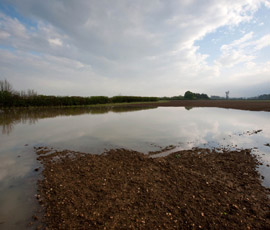NFU: £1.3bn black hole caused by 2012 weather

A new approach to farm policy is needed to allow British agriculture to recover from a £1.3bn “black hole” following the horrendous weather of 2012, said NFU president Peter Kendall.
As we enter 2013, Mr Kendall has called for “fresh thinking” on farm policy from the government as farmers and growers up and down the country continue to suffer from the consequences of extreme weather across the world.
“We know drought in the key production regions across the globe is the main driver for rocketing animal feed costs while in stark contrast at home, a wash-out summer further compounded by a sodden autumn and winter has hammered production,” said Mr Kendall.
“Climate change scientists have long predicted that agriculture will face major challenges from global warming. However 2012 has starkly demonstrated the cost that extreme weather events can wreak on farmers and the food supply chain.”
The NFU estimated that the bad weather in 2012 had led to a financial black hole of £1.3bn on British farms, with many farmers facing the double-whammy of flooding and huge feed bills, he added.
“Extreme weather will certainly require fresh thinking from agricultural policy makers and the whole food supply chain to ensure that our farmers can adapt and our food supply is resilient,” said Mr Kendall.
Better relationships were needed in the supply chain to help farmers plan during these volatile and uncertain times; this would be aided by the Grocery Adjudicator, which will help root out bad practice in the supply chain and moves by many retailers to crate more stable, long-term relationships with farmers, he said.
CAP lifeline
Commenting on CAP reform and EU financial support for farmers, Mr Kendall said 2012 demonstrated that CAP is “an absolute lifeline to many farmers”.
Any reduction in support payments needed to take place evenly across Europe’s single market, he warned. “Already an English dairy farmer, on a typical 100ha farm, receives €20,000 a year less than a Danish or Dutch competitor. This has to stop,” he said.
“Recently, we have heard government representatives refer to these support payments as ‘worthless’, arguing that payments should only go to environmental goals. With the possible exception of Sweden, the UK government is the only one out of 27 member state countries in the EU arguing in this way,” said Mr Kendall.
“Extreme weather will certainly require fresh thinking from agricultural policy makers and the whole food supply chain to ensure that our farmers can adapt and our food supply is resilient.”
Peter Kendall
“I firmly believe the only likely outcome of this strategy is further discrimination against English farmers. What is more, this ideologically-driven approach is outdated given the increasing volatility in global prices and the challenging global climate.”
He called on ministers to think long and hard about how English farmers could survive in the face of any future hostile weather events with less support than they receive now.
“As farmers look out over their sodden fields this New Year’s Day they remain generally optimistic for the longer-term, but this will be a crucial year when the building blocks for a secure food supply and resilient farming sector are put in place,” added Mr Kendall.
“Our industry is well-placed to help deliver jobs and growth in 2013 but for the longer-term we need fresh thinking that builds confidence and resilience for meeting one of society’s greatest challenges; feeding a growing population in a smarter, more sustainable way.”
Kendall remains optimistic about future of farming
For more information on 2012’s extreme weather see our interactive weather map
